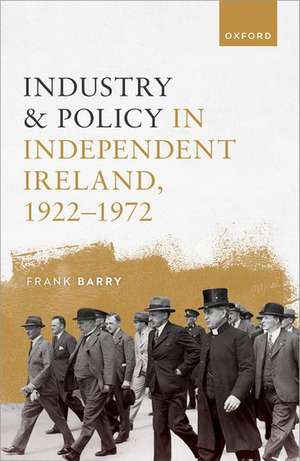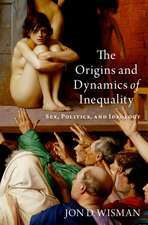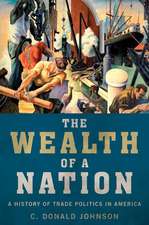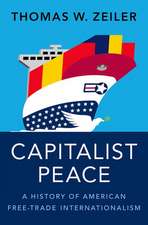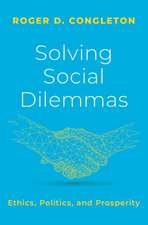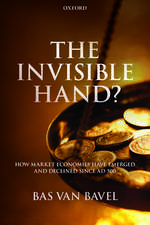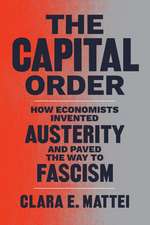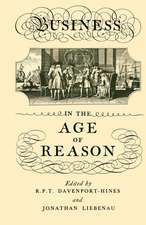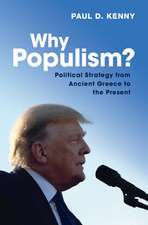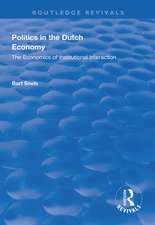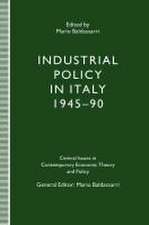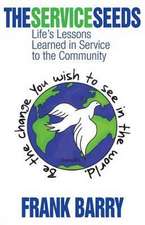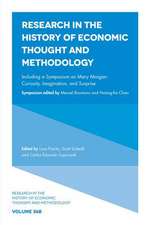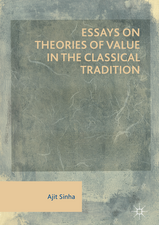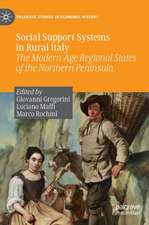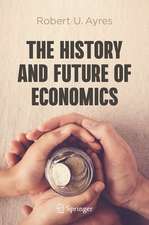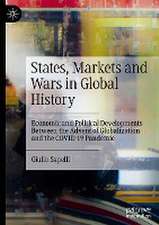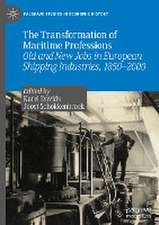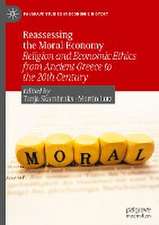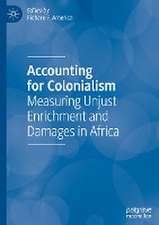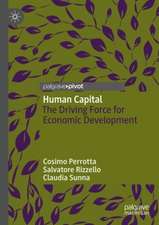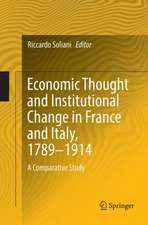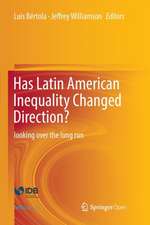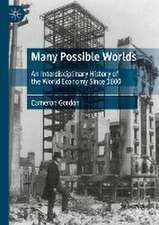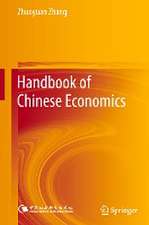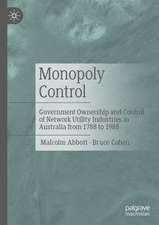Industry and Policy in Independent Ireland, 1922-1972
Autor Frank Barryen Limba Engleză Hardback – 27 sep 2023
Preț: 437.91 lei
Preț vechi: 604.30 lei
-28% Nou
Puncte Express: 657
Preț estimativ în valută:
83.79€ • 91.31$ • 70.61£
83.79€ • 91.31$ • 70.61£
Carte disponibilă
Livrare economică 22-28 martie
Livrare express 19-25 martie pentru 107.37 lei
Preluare comenzi: 021 569.72.76
Specificații
ISBN-13: 9780198878230
ISBN-10: 0198878230
Pagini: 256
Dimensiuni: 160 x 240 x 20 mm
Greutate: 0.53 kg
Editura: OUP OXFORD
Colecția OUP Oxford
Locul publicării:Oxford, United Kingdom
ISBN-10: 0198878230
Pagini: 256
Dimensiuni: 160 x 240 x 20 mm
Greutate: 0.53 kg
Editura: OUP OXFORD
Colecția OUP Oxford
Locul publicării:Oxford, United Kingdom
Recenzii
Frank Barry is a political economist who has engaged with the economic history and policy making of independent Ireland. This book provides an analysis of the changing nature of industrial policy over a 50-year period. Barry has also compiled considerable data on the different industrial sectors, the size of individual firms and the composition of the industrial workforce.
For those more interested in the history of Irish business than in policy matters, this book delivers. It surveys the biggest employers in the economy at independence and intervals over the next 50 years. These surveys, and what is made of them, are among the most detailed histories of Irish business yet written. Anyone who wants to understand how the Irish corporate world has evolved over the past century will learn a lot from this book.
Industry and Policy in Independent Ireland, 1922â1972 by Frank Barry is a fascinating book based on an analysis of Irish industry in the immediate postindependence period. Barry's work shows the development and changes present in various Irish industries, the role of the state, and the modernisation of the Irish economy from a principally agrarian focus to a globalised manufacturing focus that took Ireland into the modern world.
Barry's book has cleared the fog to reveal the details of a major area of Irish economic history that we were unable to previously view.
Industry & Policy in Independent Ireland is foremost a macro business history of Ireland. By this, I mean that Barry surveys businesses and quantifies the size of companies at various points in time, creating a database painstakingly compiled from a wide array of source material. This business history focus is to be lauded because, as Barry notes, there has been a tendency in Irish economic history to focus primarily on the role of the state in economic development. However, this macro focus has come at the expense of any micro examination of firm level records. There has been an implicit trade-off between breadth and depth, but by highlighting the big players Barry has provided a road map for future scholars to do the digging.
One of the most striking facts revealed by Barry's research is how far the Irish industrial economy at the time of the break with Britain was dominated by companies run by Protestant and Unionist owners-in a sense 'foreigners' in the newly independent, Catholic-dominated state. While a significant number of these owners exited the country after 1922, the policies of free trade and financial orthodoxy of the first ten years of the new state helped to maintain some attractiveness for investors who might otherwise have joined the exodus.
For those more interested in the history of Irish business than in policy matters, this book delivers. It surveys the biggest employers in the economy at independence and intervals over the next 50 years. These surveys, and what is made of them, are among the most detailed histories of Irish business yet written. Anyone who wants to understand how the Irish corporate world has evolved over the past century will learn a lot from this book.
Industry and Policy in Independent Ireland, 1922â1972 by Frank Barry is a fascinating book based on an analysis of Irish industry in the immediate postindependence period. Barry's work shows the development and changes present in various Irish industries, the role of the state, and the modernisation of the Irish economy from a principally agrarian focus to a globalised manufacturing focus that took Ireland into the modern world.
Barry's book has cleared the fog to reveal the details of a major area of Irish economic history that we were unable to previously view.
Industry & Policy in Independent Ireland is foremost a macro business history of Ireland. By this, I mean that Barry surveys businesses and quantifies the size of companies at various points in time, creating a database painstakingly compiled from a wide array of source material. This business history focus is to be lauded because, as Barry notes, there has been a tendency in Irish economic history to focus primarily on the role of the state in economic development. However, this macro focus has come at the expense of any micro examination of firm level records. There has been an implicit trade-off between breadth and depth, but by highlighting the big players Barry has provided a road map for future scholars to do the digging.
One of the most striking facts revealed by Barry's research is how far the Irish industrial economy at the time of the break with Britain was dominated by companies run by Protestant and Unionist owners-in a sense 'foreigners' in the newly independent, Catholic-dominated state. While a significant number of these owners exited the country after 1922, the policies of free trade and financial orthodoxy of the first ten years of the new state helped to maintain some attractiveness for investors who might otherwise have joined the exodus.
Notă biografică
Frank Barry is Professor of International Business and Economic Development at Trinity College Dublin and a member of the Royal Irish Academy. He holds a PhD in Economics from Queen's University, Ontario, and has held visiting positions at the Universities of Stockholm, California, and New South Wales, and with the Harvard Institute for International Development. He has served as an economic consultant across the developed and developing world. His research interests are in foreign direct investment and the modern economy, and in Irish economic and business history.
